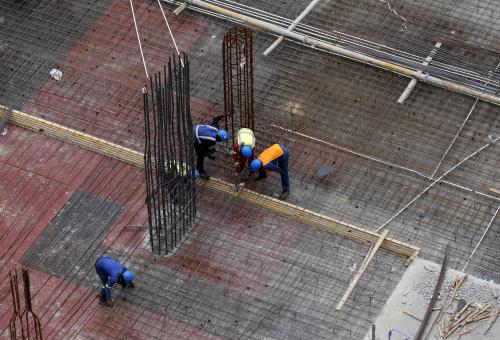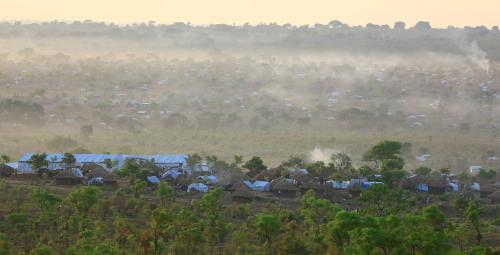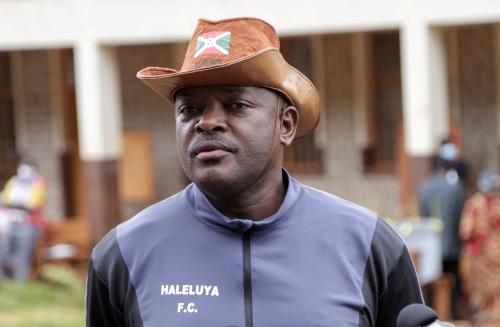IMF recommends policies for restarting the continent’s growth in the recent Regional Economic Outlook
Early this week, the International Monetary Fund released its Regional Economic Outlook for sub-Saharan Africa and slightly increased its growth prediction for the region from 1.4 percent to 2.6 percent. Several obstacles still stand in the region’s way, including increased global uncertainty, revenue loss in commodity-exporting countries, rising public debt, and nonperforming loans in the banking sector. Thus, the report notes that sub-Saharan Africa is starting from a weak position, with many oil-exporters (especially Nigeria) in recession, political uncertainty, and the growing famine as well its causes—namely drought, pests, and conflict. This edition’s theme, “Restarting the growth engine,” calls for African policymakers to reverse this trend by reestablishing the conditions necessary for strong and sustainable growth. A top priority is fiscal consolidation for struggling commodity-reliant countries, and strengthening fiscal and external buffers to reduce vulnerabilities in growing economies.
The report also highlights the role of the informal sector in the region, which contributes an average of 38 percent of GDP and an average of 60 percent of nonagricultural employment in sub-Saharan Africa. The authors note that, since the informal sector provides a “safety net” for the rapidly growing youth population, policymakers should concentrate on “nurturing productivity gains” rather than increasing taxes on these enterprises. At the same time, policymakers must improve access to finance and foster product market efficiency in order to help formalize the economy..
Nigerian government negotiates the release of 82 Chibok girls abducted by Boko Haram
On Sunday, May 7, more than three years after Boko Haram abducted 276 schoolgirls from the northeastern town of Chibok, 82 of the girls were released by the terrorist group. As the nation celebrated their freedom, President Muhammadu Buhari met with the girls in Abuja and reiterated the government’s commitment to freeing the remaining 113 still held captive by Boko Haram. Shortly after the meeting, he announced that he would immediately return to London on medical leave.
The Nigerian government worked alongside the Swiss government, the International Committee of the Red Cross, and local and international nongovernmental organizations to negotiate the girls’ freedom, ultimately swapping five Boko Haram prisoners in exchange for the girls. The prisoner swap sparked controversy, with a faction of the opposition party arguing that the release of the terror suspects was counterproductive in the country’s fight against terrorism. For the most part, however, the jubilation from the girls’ release outshone critiques of the government’s tactics. Minister of Women Affairs and Social Development, Senator Aisha Alhassan, maintains that the government is intensifying its efforts to negotiate with Boko Haram to free the remaining girls. The newly released girls will likely join the other girls who escaped from Boko Haram since the mass abduction in April 2014 in a government facility where they will receive psychosocial support and remedial classes to catch up on the coursework they missed during their captivity—following the reunion with their families.
Arrest of Zambia’s opposition leader may challenge the country’s political stability
This week, Zambia’s opposition leader, Hakainde Hichilema of the United Party for National Development (UPND) appeared in magistrate court to face treason charges. Before being transferred to the high court, the charges must be examined at the magistrate court in order to determine their constitutional legitimacy. Treason suspects in Zambia are held without bail, with the maximum penalty if found guilty being death.
Hichilema was arrested and charged with treason after blocking President Edgar Lungu’s motorcade last month. The two men’s convoys were headed to an official ceremony when Hichilema’s convoy allegedly refused to make way for the president’s. The UPND’s legal team has asked that treason charges be dropped, as the charges did not specify the how he tried to topple the government.
The treason charges are now threatening the stability of the country as violent protests erupt following the arrest in April, with reports of fires at courthouses, markets, and a university. The protests comes as a shock since Zambia has often been upheld as southern Africa’s most stable democracy.
Tension have been high between the current president and Hichilema since the 2015 snap elections, which occurred after Zambia’s then-president passed away. When the official results showed that President Lungu won the elections by a 28,000-vote margin, Hichilema’s party stated that the margin was too narrow to reflect the will of the people. The results of the elections were unsuccessfully challenged in court. Zambia then held elections in August 2016, after the 19-month tenure of Lungu, which again saw Hichilema and President Lungu in the runoff election. This time, the margin of victory stood at 200,000 votes, again for Lungu.







Commentary
Africa in the news: IMF releases Africa’s Regional Economic Outlook, 82 Chibok girls return home, and Zambian Hichilema faces treason charges
May 12, 2017